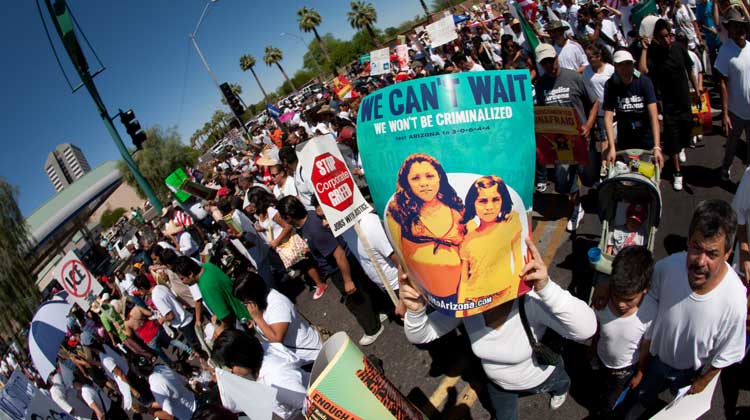
Victor Davis Hanson, historian and senior fellow at the Hoover Institution, sat down for “The Classicist” podcast recently and explored the complexities of the ongoing illegal immigration debate.
He began by relating a story of one of his best students at Cal State Fresno. The student was in the country illegally and trying desperately to stay and continue to graduate school. While walking through campus, Hanson saw this student during the fight for Proposition 187 in California, which would have provided a screening system to keep illegal aliens from utilizing public services.
The student was burning an American flag and holding a Mexican flag. Hanson said he asked the student why he was waving the flag of a country to which he didn’t want to return and burning the flag representing the country in which he wanted to stay.
It’s something Hanson said he continues to see.
“We have all of these grassroots pushbacks, and yet the pushbacks—when you go to the rally or go by them in the car—they’re all Mexican flags and they’re quite racially chauvinistic, and they’re angry at the United States, and yet, it doesn’t compute,” Hanson said. “If they’re angry at the United States, they can go back to Mexico—and they’re Mexican citizens, they’re not U.S. citizens.”
It’s an incoherent disconnect Hanson said is hard to explain. Part of it, he said, might be a feeling of inferiority among immigrants, due to things like lack of education, money, English speaking skills, or simple sophistication. But he also said there’s little cognizance or recognition of the reason immigrants come here in the first place.
“When I go to Mexico, it seems to me a very wealthy country—they have oil, they have strategic minerals, they have wonderful farmland, they’ve got a great climate, they’ve got a long coastline, their position between north and south America,” Hanson said. “They have everything going for them, but nothing works.”
He noted a few possibilities for reform that might work in Mexico, such as a bill of rights, judicial transparency, private property—the things that have worked for the United States.
“That western paradigm could quickly reform Mexico,” Hanson said. “And yet, they will not make the needed reforms, because they count on us to alleviate their tension.”
Another puzzling aspect of the debate, he said, is that the differences between the two societies is not articulated.
“They’ve conflated or they’ve fused together this notion of ‘residency’ and ‘citizenship,’ and that if you are physically in a place, then you should enjoy all the rights of that place has to offer—legally, politically, culturally, socially,” Hanson said. “And you and I know if we go down to Mexico, that’s not true.”
Still, he said, illegal aliens come here and believe they should enjoy all the benefits and services enjoyed by U.S. citizens simply by crossing the border.
Since President Trump’s inauguration, however, Hanson said things have changed and people might start to better recognize what’s going on.
“Trump came on and sort of took a hammer, and he swung it over his head and he threw it—like that Apple commercial [of] the ‘80s—into the screen, and everybody’s shrieking,” he said. “But everybody’s sort of saying, ‘You know what? That’s kind of a normal reaction, and what was really abnormal was what was going on; the mentality of illegal immigration is just completely Orwellian.”
Listen to the complete podcast at The Classicist.
© 2018 Homeland411